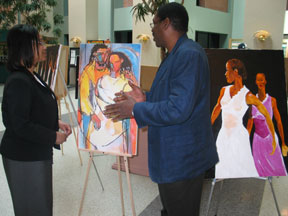 |
Neville Murray discusses his artwork with Angela Knowles, a clinical study assistant in the department of internal medicine-pulmonary. |
On Feb. 23, the audience received an in-depth historical account of the famed Tuskegee Airmen of World War II – America’s first African American military aircraft pilots and support personnel. The Tuskegee Airmen set a standard of excellence and achievement that still resonates throughout all the nation’s armed forces.
Bob Rose, president of Nebraska’s Alonza W. Davis chapter of the Tuskegee Airmen, presented a detailed video history of the group. He then showed another video promoting the 2004 Tuskegee Airmen National Convention in Omaha on Aug. 2-8. Rose also is president of the convention.
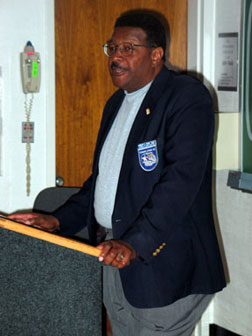 |
Bob Rose talks about the Tuskegee Airmen of World War II. |
Rose shared background information on major events surrounding the Tuskegee Airmen, including the HBO television movie – Tuskegee Airmen – released in 1996. One of the most critical moments in gaining public acceptance for blacks to fly as military pilots was when Eleanor Roosevelt, wife of President Franklin D. Roosevelt, insisted on having one of the students give her an airplane ride, thus showing the world her confidence in their flying skills. Rose said in the movie a student flew Mrs. Roosevelt, but in reality she was flown by one of the instructors masquerading as a student.
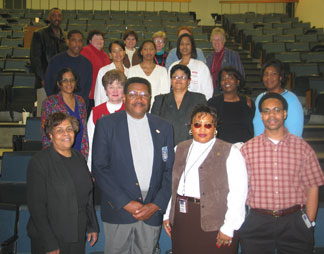 |
Bob Rose, front row second left, with members of the Employee Diversity Network and campus staff. |
Nu Beginning opened with an harmonic version of the Black National Anthem, “Lift Every Voice and Sing,” then performed for almost an hour, using only a small boom box with a CD of pre-recorded music tracks for accompaniment.
About half of their material was original R&B tunes, along with some well-known R&B covers. The four women, Rachel Sanders, Charlotte Cox, Kionna Shaw and Christi Woods, also sang “Giving Him Something He Can Feel” by the Grammy-winning female group En Vogue. Then, taking audience requests, Nu Beginning sang “The Lord’s Prayer” and a rhythmic rendition of “Over the Rainbow” that drew a standing ovation from the nearly 100 people in the audience.
Nu Beginning’s first CD is due for distribution in late spring. In addition, the group will be featured in an upcoming Omaha musical, performing several original compositions.
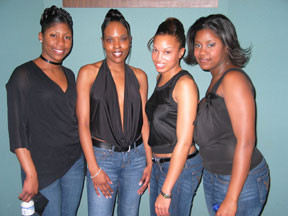 |
Nu Beginning members, from left, Kionna Shaw, Christi Woods, Charlotte Cox, and Rachel Sanders. |
“My art reflects the experiences that I have encountered in my life.” Murray said. “As a Jamaican who currently resides in Nebraska, I can clearly see the importance of one’s art to one’s culture. My art deals with issues that confront Africans in the Diaspora [international distribution of African slaves], from the poise and dignity reflected in the proud but poor Caribbean market vendors, to the positives as well as the despair and addictions that take place in our inner cities, to simply evaluating our place in the 21st century.
“Through my art I try to express issues that relate to my history, including slavery, loss of identity and language, and how this experience manifests itself in the 1990s.”
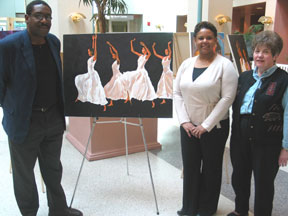 |
Neville Murray with Linda Cunningham, center, coordinator for cultural competence, UNMC Community and Multicultural Affairs, and co-chair of Employee Diversity Network; and Susan Langdon, clinical coordinator, UNMC Medical Technology Education. |
“Because of these experiences I feel it is very important for me to record and document my own heritage, specifically western Jamaica and its rapidly changing environment,” Murray said.
Campus employees also enjoyed a video screening of this year’s Martin Luther King Day presentation by journalist Tony Brown. For more on his presentation, see the UNMC Today Archives on Jan. 20.